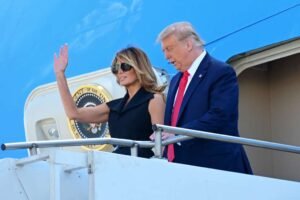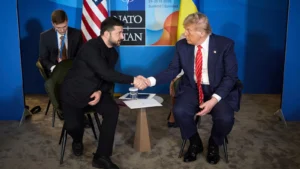Trump Arrives in Scotland Ahead of High-Stakes Trade Talks with EU and UK

Former U.S. President Donald Trump landed in Scotland on July 25 to play host at his Turnberry golf resort and engage in crucial trade discussions with European and British leaders. His four-day visit includes meetings with European Commission President Ursula von der Leyen and UK Prime Minister Keir Starmer.
Trade Deal Prospects: EU and UK on the Agenda
-
Trump said there’s a “50‑50 chance” of clinching a U.S.–EU trade agreement before the August 1 tariff deadline, warning that failure could trigger a 30% tariff on EU imports. Negotiators are considering a compromise: 15% tariffs on most EU goods, with exceptions for steel and aluminum.New York Post+15Al Jazeera+15X (formerly Twitter)+15
-
If approved, the EU deal could mirror the U.S.–Japan trade pact, and discussions on tariffs for sectors like cars, pharmaceuticals, and industrial goods are key sticking points.Wall Street JournalFinancial TimesPoliticoWikipédia
-
Trump is also meeting PM Starmer on Monday to review and potentially enhance the UK trade framework signed in June—setting the first 100,000 UK car exports at 10% tariffs.Wikipédia+2Al Jazeera+2inkl+2
Broader Context & Political Messaging
-
Ahead of trade talks, Trump criticized European immigration policies and wind power, saying they threaten Europe’s cultural identity and natural heritage.AP News+7inkl+7The Times+7
-
His meetings face opposition: over 5,000 security personnel are stationed around Turnberry, and protests erupted in Scotland—particularly targeting both Trump and PM Starmer.Wikipédia+7inkl+7AP News+7
-
Trump spent time golfing at Turnberry, drawing both support and criticism amid escalating trade and immigration rhetoric.YouTube+4inkl+4AP News+4
Final Takeaway
Donald Trump’s Scotland trip—part golf tour, part high-stakes diplomacy—is being closely watched as a potential turning point in U.S.–EU trade relations. With a tight deadline, rising tensions over tariffs, and political protests growing louder, the coming week could prove decisive for a new era of transatlantic economic policy.






